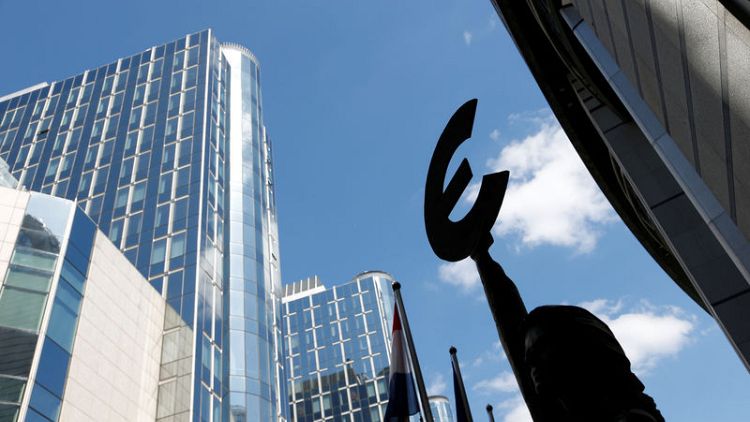By Jan Strupczewski
BRUSSELS (Reuters) - Euro zone finance ministers will discuss on Thursday how to finance a future budget for the 19 countries sharing the euro, although no final decisions are expected until June.
The future euro zone budget is to be part of the next EU-wide long-term budget starting in 2021. It is aimed at making euro zone economies more competitive and getting them more in sync with each other, rather than at stabilising them during economic downturns.
Its size will be set by euro zone leaders "in the context" of the EU budget, or multiannual financial framework (MFF). That vague phrase, however, leaves more leeway for leaders' decisions.
"When we talk about money with finance ministers the debate is always difficult, but I am sure that we will make progress," the chairman of the meeting Mario Centeno told reporters.
"The resources for the budget have to be discussed in the context of the MFF, we are looking at possibilities to leave the debate open so that in the future other resources may be added to the budget," Centeno said.
Officials said France and Germany have agreed to finance the euro zone budget with a mix of money from the bigger EU budget and dedicated taxes such as the financial transaction tax. France has also been pushing for a tax on digital economy.
For such additional financing, euro zone governments would have to sign a special intergovernmental agreement, like the treaty that created the euro zone bailout fund.
The European Commission opposes this approach, because this would put the budget firmly in the hands of governments and curb the influence of EU institutions and EU law, officials said.
In an effort to balance national and EU powers over the new pool of money, ministers agreed in April that the European Commission, with the approval of euro zone governments, would set the priorities for the budget.
The discussion is the latest step in the euro zone's long-standing drive for deeper economic integration that is intended to make it more resilient to economic crises in the future.
The 28 countries that now form the European Union already have a shared EU budget, which is set every seven years and equal to 1% of the bloc's gross national income.
Euro zone countries also want to have a separate budget for their group, to serve as a fiscal tool to intervene in the euro zone economy alongside the single monetary policy of the European Central Bank.
Work on the construction of such a euro zone budget has been under way from the start of the year and is to finish in June.
(Additional reporting by Peter Maushagen; Reporting by Jan Strupczewski; Editing by Hugh Lawson)



